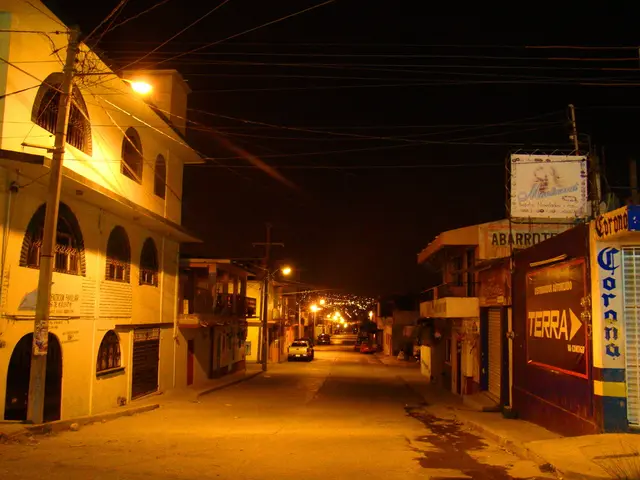Escalating tensions between India and Pakistan after attack on tourists by separatists in Kashmir, controlled by India. Nuclear powers teetering on strategic standoff following events in Pahalgam.
Islamabad, Pakistan - Stern words have been spoken between Pakistan and India, with Pakistan threatening to pull out of the 1972 Simla Agreement over India's decision to seal the border and suspend its participation in the Indus Water Treaty. This dramatic move leaves both nations teetering on the brink of a fresh conflict.
The Simla Agreement—a peace accord signed between the two countries shortly after Bangladesh secured independence from Pakistan—helped to establish the Line of Control as the de facto border between India-administered and Pakistan-administered Kashmir. If Pakistan follows through on its threat, it could potentially jeopardize the agreement, putting both countries at risk of escalating hostilities.
On the Offensive
Pakistan's National Security Committee, comprised of top government officials and military forces, gathered for a meeting on Thursday and issued a solid warning to India, declaring any interference with Pakistan's water supply to be "an act of war."
In retaliation to India's suspension of the Indus Water Treaty, Pakistan has threatened to axe its own involvement in the Simla Agreement, increase its military readiness, and close the Wagah border post with immediate effect. Additionally, India's defense advisors have been designated as "personae non grata" in Pakistan, while the number of Indian diplomatic staff stationed in Pakistan has been slashed. Pakistani airspace has been shut to Indian airlines, and all trade between the two nations has been halted.
These actions were a direct response to the devastating attack on tourists in Indian-administered Kashmir, which resulted in the deaths of at least 26 individuals. In the aftermath of the horrific incident, India announced a series of measures, including the suspension of its participation in the Indus Water Treaty, a six-decade-old agreement that grants both countries the ability to irrigate their agricultural lands.
Tit for Tat
Speaking after a cabinet meeting, chaired by Indian Prime Minister Narendra Modi, a senior government official expressed India's condemnation of Pakistan, stating that it was now time for Pakistan to accept accountability for the heinous attack.
Pakistan's Foreign Minister Ishaq Dar, who also serves as deputy prime minister, dismissed India's accusations as immature and hasty, accusing India of resorting to sensationalism mere hours after the tragic event. Defense Minister Khawaja Asif echoed Dar's sentiments, categorically rejecting India's insinuation that Pakistan was complicit in the crime.
Amid the escalating tensions, commentators and political leaders in India have been openly discussing the possibility of launching a military strike on Pakistan, sparking fears of a repeat of the 2019 Balakot strikes, when India sent jets across the border to target what it claimed were militant hideouts. Pakistan disputed the claim, stating that the jets struck an uninhabited forest and responded in kind, with no casualties reported on either side.
Indian Defence Minister Rajnath Singh also hinted at a "strong response," reiterating India's "zero tolerance" policy on terrorism.
Ready for Action
Security analysts in Pakistan maintain a heightened state of mindfulness, knowing that their country is prepared for "any Indian misadventure." With daily reports of inflammatory rhetoric in the Indian media and calls for a strong response, Pakistan remains steadfast, ready to respond as necessary.
However, the potential consequences of another military conflict between the two nuclear-armed nations are grave. Both countries share a population that exceeds 1.5 billion, have fought four wars, and are situated in a complex geopolitical landscape, making the stakes of any such conflict immeasurably high.
As the situation unfolds, the likelihood of a diplomatic solution appears to be increasingly remote. Players on the world stage, including the United States, China, and the European Union, will be watching closely, with the hopes of a peaceful resolution to the ongoing crisis.
Please note: The above article is an informative article based on available information at the time of its creation. Al Jazeera and its contributors are not responsible for any consequences that may arise from readers acting on any actions or interpretations derived from the content. For the most accurate and timely information, readers are encouraged to consult official sources and experts.
[1] India suspends participation in Indus Water Treaty, closes border with Pakistan in fallout from attack: Report
[2] Pakistan threatens to suspend Simla Agreement with India following border closure and Indus Water Treaty suspension: Report
[3] Line of Control - Kashmir conflict
[4] International Community's Role in Kashmir
[5] Impact of the Pakistan-India trade dispute on Pakistan's economy
- Amidst the growing tensions, Pakistan's National Security Committee issued a strong warning, declaring any Indian interference with Pakistan's water supply as an act of war, in response to India's decision to seal the border and suspend its participation in the Indus Water Treaty.
- In light of the attack on tourists in Indian-administered Kashmir, Pakistan threatened to pull out of the 1972 Simla Agreement, increase military readiness, and close the Wagah border post, while designating Indian defense advisors as "personae non grata" and reducing the number of Indian diplomatic staff in Pakistan.
- The diplomatic and economic repercussions of the situation were substantial, with Pakistan shutting its airspace to Indian airlines and halting all trade between the nations, in a tit-for-tat response to India's measures.
- The Indian government issued strong condemnations of Pakistan in response to the attack, calling for accountability, while Pakistan dismissed the accusations as senseless and premature.
- The war and conflicts domain of general news has been abuzz with war rhetoric from both sides, raising concerns of a repeat of the 2019 Balakot strikes and potential escalation of hostilities between the two nuclear-armed nations.
- The cultural and political landscape of Pakistan is preparing for any military action from India with vigilance, as the world watches closely, hoping for a peaceful resolution to the ongoing crisis and potential diplomatic agreements to resolve the issues at hand.
- The unrest in the region is not confined to war and conflicts; it also has deep repercussions on crime and justice, as the ongoing crisis disrupts everyday life and threatens the region's fragile peace.








